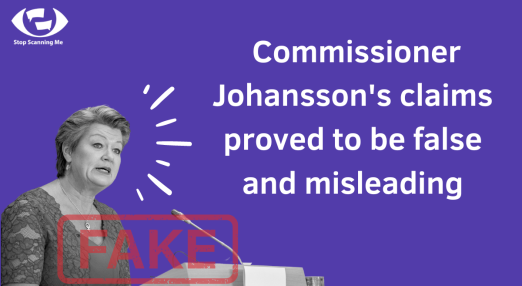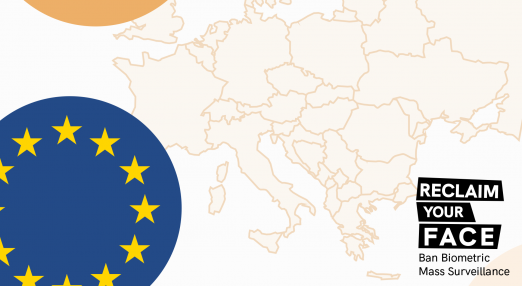Our work
EDRi is the biggest European network defending rights and freedoms online. We work to to challenge private and state actors who abuse their power to control or manipulate the public. We do so by advocating for robust and enforced laws, informing and mobilising people, promoting a healthy and accountable technology market, and building a movement of organisations and individuals committed to digital rights and freedoms in a connected world.
Filter resources
-

Member in the Spotlight: ARTICLE 19
ARTICLE 19 is an international ‘think-do’ organisation that propels the freedom of expression movement, locally and globally, so people everywhere can realise the power of their voices. It works for a world where everyone can freely express themselves and actively engage in public life without fear of discrimination.
Read more
-

Government bans TikTok (sort of), Facebook has a bad day in court, and civil society organisations mobilise against Big Tech
Read through the most interesting developments at the intersection of human rights and technology from the Netherlands. This is the third update in this series.
Read more
-

Missing: people’s rights in the EU Digital Decade
In June 2023, the European Union (EU) will adopt its first report on the state of the ‘Digital Decade’ – a plan launched in 2022 with digitalisation targets for business, public services and people’s digital skills. The Digital Decade reads more like a business plan than a policy programme.
Read more
-

EDRi-gram, 17 May 2023
Last week, European Parliament committees voted to protect people’s rights in the AI Act. In a landmark moment, Members of Parliament (MEPs) supported all key civil society demands. We’re still concerned about some gaps and loopholes but it’s a big win for our network and partners’ work! The PEGA committee also adopted its final report and recommendations. It included many valuable proposals but failed to go all the way in calling for an EU-wide ban on spyware. You can also read our take on what’s missing from the EU Digital Decade report (spoiler alert: our rights).
Read more
-

Commissioner Johansson cannot be trusted with the EU’s proposed CSA Regulation
In the midst of a wide range of concerning practices and behaviours, EDRi has found it necessary to raise a formal complaint against the EU’s Home Affairs department for possible breaches of independence.
Read more
-

The CSA Regulation: how did it reach this point?
How did we reach this point of even discussing a law (Child Sexual Abuse Regulation) that so manifestly undermines our democratic structures, threatens to override the fundamental rights that generations have been fighting for, and ignores solid evidence and unanimous professional expertise?
Read more
-

EU Parliament sends a global message to protect human rights from AI
Today, the Internal Market Committee (IMCO) and the Civil Liberties Committee (LIBE) committees took several important steps to make this landmark legislation more people-focused by banning AI systems used for biometric surveillance, emotion recognition and predictive policing. Disappointingly, the MEPs stopped short of protecting the rights of migrants.
Read more
-

Do you trust the police? CJEU Advocate General accepts access to phones for any type of crime
In its opinion on the Bezirkshauptmannschaft Landeck case, the Advocate General of the European Court of Justice is failing to suggest adequate safeguards for police access to our smartphones.
Read more
-

PEGA Committee does not go all the way on spyware regulation
On 8 May 2023, the Committee of Inquiry of the European Parliament investigating the use of Pegasus and equivalent surveillance spyware (PEGA) adopted its final report and recommendation, after 14 months of hearings, studies and fact-finding missions.
Read more
-

Will MEPs ban Biometric Mass Surveillance in key EU AI Act vote?
The EDRi network and partners have advocated for the EU to ban biometric mass surveillance for over three years through the Reclaim Your Face campaign. On May 11, their call may turn into reality as Members of the European Parliament’s internal markets (IMCO) and civil liberties (LIBE) Committees vote on the AI Act.
Read more
-

LIBE lead MEP fails to find silver bullet for CSA Regulation
On 19 April 2023, the lead MEP on the proposed CSA Regulation, Javier Zarzalejos (EPP), published his draft report. Whilst we agree with MEP Zarzalejos about putting privacy, safety and security by design at the heart, many of his changes may pose a greater risk to human rights online than the European Commission’s original text.
Read more
-

EDRi-gram, 3 May 2023
This week, as the EU Parliament gets ready to vote on the AI Act, we are urging members of Parliament to protect people’s rights in this landmark legislation. We are putting forward our recommendations to lawmakers on protecting journalists from all kinds of surveillance through the European Media Freedom Act. Among other digital rights updates, read about how Irish and French Parliamentarians have become the latest voices to sound the alarm against monitoring of people’s messages in the proposed Child Sexual Abuse Regulation. You can still share your feedback on the draft programme for an initial decolonising process for the digital rights field in Europe.
Read more
